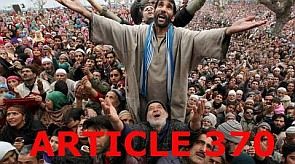 | « Back to article | Print this article |
 The Rashtriya Swayamsevak Sangh has launched an ambitious plan to reach out to at least 10,000 key opinion makers -- jurists, bureaucrats, etc -- in the next two years to dispel "misinformation" related to Article 370 of the Constitution.
The Rashtriya Swayamsevak Sangh has launched an ambitious plan to reach out to at least 10,000 key opinion makers -- jurists, bureaucrats, etc -- in the next two years to dispel "misinformation" related to Article 370 of the Constitution.
The Article gives Jammu and Kashmir a special status.
The state has its own set of laws related to citizenship and ownership of property. As is the case with several areas in the Northeast and Himachal Pradesh, outsiders cannot purchase property in the state.
The RSS push for more debate on the issue comes months before assembly elections in the state.
The Sangh is keen on leveraging the positive public opinion which, it believes, the Prime Minister Narendra Modi-led government has generated by efficient rescue operations in the flood-hit Kashmir valley in recent days.
As part of a two-pronged strategy, the RSS plans to question the legality of the Article, as well as convince the populace of the state the Article has done them, particularly disempowered sections such as tribals and women, harm.
Arun Kumar, member of RSS' national executive, is leading this initiative.
"The problem of J&K is only about information -- misinformation in J&K and lack of information in the rest of the country," he says.
On Wednesday, Kumar unveiled a study in this regard, Impact Analysis of Article 370.
The study, published in Hindi and English, has been conducted under the auspices of the Madhya Pradesh government-funded Makhanlal Chaturvedi National University of Journalism and Communication. RSS-affiliated think-tank, Jammu & Kashmir Study Centre assisted in the study.
The 20-page study report argues due to Article 370, J&K